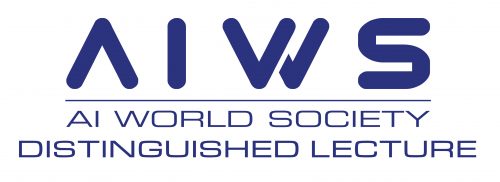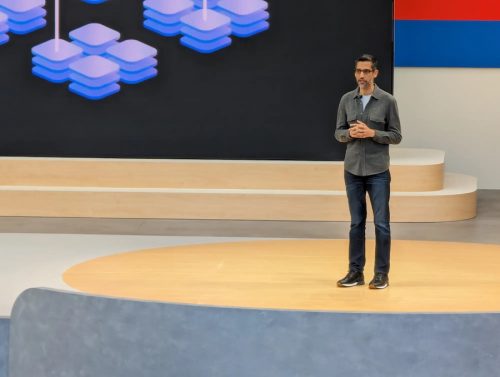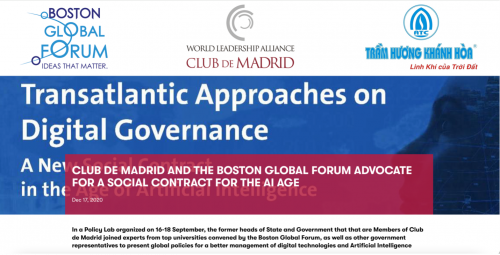On December 12, 2018, Michael Dukakis Insitute for Leadership and Innovation (MDI) honored Rt. Hon. Liam Byrne MP, Member of Parliament for Birmingham, Hodge Hill, Shadow Digital Minister, Chair of the All-Party Parliamentary Group on Inclusive Growth, as the first AI World Society Distinguished Lecture. Rt. Hon. Byrne sent a lecture.

“Governor Dukakis, Mr President and Minister Taro Kono, friends and colleagues.
Let me apologise at once for speaking to you virtually.
Believe me, I am there with you in spirit!
Given the turmoil of our capital today, I am yearning for the calm of your campus!
It’s a campus I remember with great love.
My days at Harvard were some of the happiest days of my life.
I was newly married to Sarah, and around our nest on Cambridge Street, the dot.com boom seemed to be changing the very laws of economics; the rules of business; the norms of society.
But revolutions are rarely predictable;
And we did not predict the profound change that was coming in the balance of power between nation and nation, and between rich and poor;
Thirty years ago years ago I remember standing in the pouring rain in a Harvard car-park pleading with a professor for a place on the course in Building Information Age Businesses,
Now I’m speaking to you about how to tame that business power.
As a student, it felt it was an era of change.
As a politician, I now know it is change of era.
What our powers of prophecy failed to foresee, was that this information age
Was also an age of American hyper-power
And an age profoundly shaped by thirty years of liberal economics.
Most of us didn’t actually believe that it was the end of history; but lots found the idea pretty seductive.
In fact, history simply turned.
And the question we face in this new era, was spelt out for me by a very senior editor at our Financial Times:
‘Is this new age, he asked, ‘set to become more “Hobbesian” than “Rawlsian”?
‘Will we change the rules to fairly distribute the benefits and burdens of this new age, or will the world resemble a nightmare of ‘all against all’?
Speaking to a Harvard audience, I thought I’d better explain how John Rawls can win the day!
Let me explain the challenge before offering a few answers.
After victory in the Cold War, we faced the challenge of winning the peace.
America/NATO was the world’s only hyper-power – but this Age of Asymmetry was bound to provoke the rise of insurgency.
And so it proved.
From Al-Qaeda to ‘active measures’, malign actors have sought to use digital technology to radicalise, to terrorise, to paralyse: exploiting technology to sow discord, to inflame two sides of any argument, in short, to divide and so rule.
But the second challenge is not foreign but domestic.
It is the rise of new super-giants in our economy, companies so big that they can bend market outcomes – and bend them towards inequality.
Inequality which is the rocket-fuel of the populism that our enemies seek to inflame.
Joseph Schumpeter, another Harvard thinker, predicted this.
Everyone remembers his description of creative destruction.
But everyone forgets corollary: the destruction of competition.
And that is what we see across the digital economy.
A rise of Technolopolies – the superstar firms – which, as economists like David Autor have explained, drive down labour’s share of national income.
Put together the Age of Insurgency and the Age of Technopoly, and we do indeed have the makings of a Hobbsian world.
WHAT WOULD RAWLS SAY?
I don’t think the status quo can last. It is simply too unstable.
But, nor do we want, even if we could have it, a Chinese approach of central state control.
We have to find a middle way and in this, John Rawls should be our guide.
Rawls used a brilliant idea – the idea of an “overlapping consensus” to describe the way we can construct the law of people and crystallise rights equal to each.
It’s this overlapping consensus that we need today.
A new consensus we should enshrine in Rights for the digital age.
A Bill of Digital Rights.
A 34th Amendment, perhaps, to your Constitution.
And a new Convention for our Council of Europe.
The content of this Novus Carta should reflect the different roles we play in life – as citizens, as workers, as consumers, as parents, as children.
But let’s start with our basic rights as citizens;
Because here we face the most dangerous paradox;
The social networks built to nurture sweet-talk have become
The echo-chambers of hate speech
As humans, we love to connect; but we fear to be different.
So those who want to play the part of a digital Mephistopheles and entice us into supporting an agenda of not building bridges, but walls, don’t have to work that hard.
And countries like Russia understand this.
Their ‘dark social playbook’ connecting hackers, fake news sites, troll farms and dark money pumping round ads on Facebook targeted with pyscho-graphic precision courtesy of firms like Cambridge Analytica, takes apart old defences of democracy because the laws we have in place are so outdated.
So let’s update them.
Here in the UK we’re looking hard at ideas like:
The Feinstein Bill creating obligations to notify authorities of glorification or conspiracy to commit terrorism;
Or Germany’s NetzDG law which seems to be working in controlling hate speech.
Or Senator Warner’s proposed a duty on platforms to clearly and conspicuously label bots to protect consumers, and to stop bots amplifying disinformation, plus a duty to determine origin of posts and/or accounts – a crucial step in ensuring that bad actors are not allowed to abuse free speech in the arena of our democracy.
As citizens, we bear the right to be fully informed: and that needs enshrining for the digital age.
Second, as workers, we face both the biggest opportunity and the biggest threat to our livelihoods for decades.
Automation will be affect some 1.2 billion of the world’s 3.2 billion workers.
It would be naive to think that won’t be disruptive.
Our challenge here is what I’ve called the Harry Bridges Test.
The legendary president of the American dockers’ union won his spurs organising in 1934 – but it was the mechanisation of the Sixties that provoked him to ask: how do we win for his members “a piece of the machine”.
The challenge, said Bridges, was how to get the machines working for the workers and not against them.
That’s our test today.
Without rights to a genuine minimum Living Wage, a right to retraining, and a right to algorithmic justice, to stop the automated discrimination of hiring, firing and managing in the work-place, we will never create the ‘project hope’ we need for the future of automation.
Third, in the marketplace for consumers, we need to act now to protect freedom of choice by protecting the reality of competition.
In many parts of the economy, especially in the digital world, competition is moving from theory to fantasy.
And this is part of a larger trend.
The founding father of economics, Adam Smith, had a lot to say about the dangers of monopoly;
‘People of the same trade’ wrote Adam Smith ‘seldom meet together, even for merriment and diversion, but the conversation ends in a conspiracy against the public, or in some contrivance to raise prices’.
Well this summer, the IMF revealed just how extensive that contrivance has become.
The rising levels of market concentration across advanced economies is pushing up price mark-ups across advanced economies – by an average of over 40% since the 1980’s.
That’s a sign, competitive forces are waning.
We shouldn’t be surprised.
As I learned at the Harvard Business School, we don’t train corporate-chieftains to protect competition; we train them – and reward them – for destroying it.
Well I remember Michael Porter teaching me ‘The essence of strategy formulation is coping with competition.[1]’
And now technology is being used systematically to destroy competition.
The world’s largest 2,500 companies now account for over 90% of global total and corporate investment in research and development.
The top 500 companies account 82% of the spend.
Many are now using this spend to create data monopolies to lock in their customers for the future.
Yet today’s competition rules don’t touch this.
Facebook has bought 69 companies since 2007.
When it bought WhatsApp, the deal turnover, some $13 billion, was too small to trigger merger control.
But buying WhatsApp, allowed Facebook to acquire a treasure trove of data on WhatsApp’s 1 billion users to add to its pile.
The risk of data-monopolies is not today a trigger for merger control.
But it should be.
Fourth, as parents, we have rights to honour, because we have duties to honour; duties to our children.
That means we have duties to safeguard our children online, where they now spend so much of their time. And who happen to make up a third of online users.
The Founders did not intend rights of free speech to undermine the healthy instruction of children.
Legislating in this field is rightly, difficult. But if we owe a duty of care to our children, why don’t social media firms.
If I built a physical arena and filled it with people, I’d be asked to manage a host of safety regulations.
Not so, in the virtual arena, where we’re seen suicide “games” spreading around social media platforms, like the “blue whale challenge”.
This dangerous “game” goads vulnerable teens into challenges, which start off as innocuous but steadily escalate into acts of self-harm.
Despite Instagram’s awareness of the “challenge” shared across its platform, the “game” has been linked to over a hundred teenage deaths in Russia, with evidence of the game spreading to the UK and India.
It’s time, therefore, that we imposed the same duties of care on social media firms bu asking them to set out the harms they know they risk creating, and inspecting them on taking appropriate steps to ameliorate those threats.
We should insist that the rights of children don’t stop at their screens; the rights of children have a digital dimensions; the right to informed use; the right to be safe, and crucially for the future, the right not simply to literacy, but digital literacy.
Finally: rights should be matched by responsibility.
Changes in technology always bring new responsibilities for many.
When Michael Faraday demonstrated electricity to Prime Minister William Gladstone, Gladstone struggled to make sense of it.
“But after all what use is it?” he asked
The exasperated scientist paused for thought.
“Well sir” replied Faraday, there is every probability that you will soon be able to tax it.”
Technology giants might like to move fast and break things. But someone has to put society back together again.
And that isn’t free. It’s expensive. Which is why we need these firms to start paying their taxes.
Conclusion
Governor, let me conclude, by acknowledging that I know that many of the changes I propose here will provoke cries of rage amongst Big Tech.
But rights, as Madison, knew are not always immutable.
They must evolve and change as society makes progress.
As Madison noted in the Federalist paper, some rights result from the nature of our life together, our compact together for living together.
Trial by jury for instance was never a natural right, but a right resulting from a;
‘social compact which regulates the action of the community…[as] essential to secure the liberty of the people as any one of the pre-existent rights of nature’.
Of all the lessons I learned at Harvard, perhaps the most important was the power of enterprise to change the world for good.
In my own study of the change-makers who built our economy, one lesson stands out: entrepreneurs change history by inventing the future.
But if we want the future to be a place of hope and opportunity for all, then we have to remember that the task of politicians to shape the market to fit society; not let the market dictate the shape of society.
That is why lawmakers and changemakers must now join forces together to reshape those wise constraints that make us free.
I hope John Rawls would approve.”
From website of The Rt. Hon. Liam Byrne, MP
https://liambyrne.co.uk/ai-world-society-distinguished-lecture/
⇒ Read full Byrne’s lecture here.










